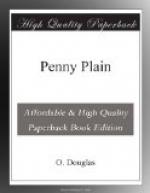The next day he was too tired to rise, and spent rather a dreary day in his rooms with the Scotsman for sole companion.
The landlord, a cheery little man, found time once or twice to talk for a few minutes, but he had only been ten years in Priorsford and could tell his guest nothing of the people he had once known.
“D’you know a house called The Rigs?” he asked him.
The landlord knew it well—a quaint cottage with a pretty garden. Old Miss Alison Jardine was living in it when he came first to Priorsford; dead now, but the young folk were still in it.
“Young folk?” said Peter Reid.
“Yes,” said the landlord, “Miss Jean Jardine and her brothers. Orphans, I’m told. Father an Anglo-Indian. Nice people? Oh, very. Quiet and inoffensive. They don’t own the house, though. I hear the landlord is a very wealthy man in London. By the way, same name as yourself, sir.”
“Do I look like a millionaire?” asked Peter Reid, and the landlord laughed pleasantly and non-committally.
The next day was sunny and Peter Reid went out for a walk. It was a different Priorsford that he had come back to. A large draper’s shop with plate-glass windows occupied the corner where Jenny Baxter had rolled her toffee-balls and twisted her “gundy,” and where old Davy Linton had cut joints and weighed out mince-collops accompanied by wise weather prophecies, a smart fruiterer’s shop now stood furnished with a wealth of fruit and vegetables unimagined in his young days. There were many handsome shops, the streets were wider and better kept, unsightly houses had been demolished; it was a clean, prosperous-looking town, but it was different.
Peter Reid (of London) would have been the first to carp at the tumbledown irregular old houses, with their three steps up and three steps down, remaining, but Peter Reid (of Priorsford) missed them. He resented the new shops, the handsome villas, the many motors, all the evidences of prosperity.
And why had Cuddy Brig been altered?
It had been far liker the thing, he thought—the old hump-backed bridge with the grass and ferns growing in the crannies. He had waded in Cuddy when he was a boy, picking his way among the broken dishes and the tin cans, and finding wonderful adventures in the dark of the bridge; he had bathed in it as it wound, clear and shining, among the green meadows outside the town, and run “skirl-naked” to dry himself, in full sight of scandalised passengers in the Edinburgh train; he had slid on it in winter. The memory of the little stream had always lain in the back of his mind as something precious—and now to find it spanned by a staring new stone bridge. Those Town Councils with their improvements!
Even Tweed Bridge had not been left alone. It had been widened, as an inscription in the middle told the world at large. He leant on it and looked up the river. Peel Tower was the same, anyway. No one had dared to add one cubit to its grey stature. It was a satisfaction to look at something so unchanging.




